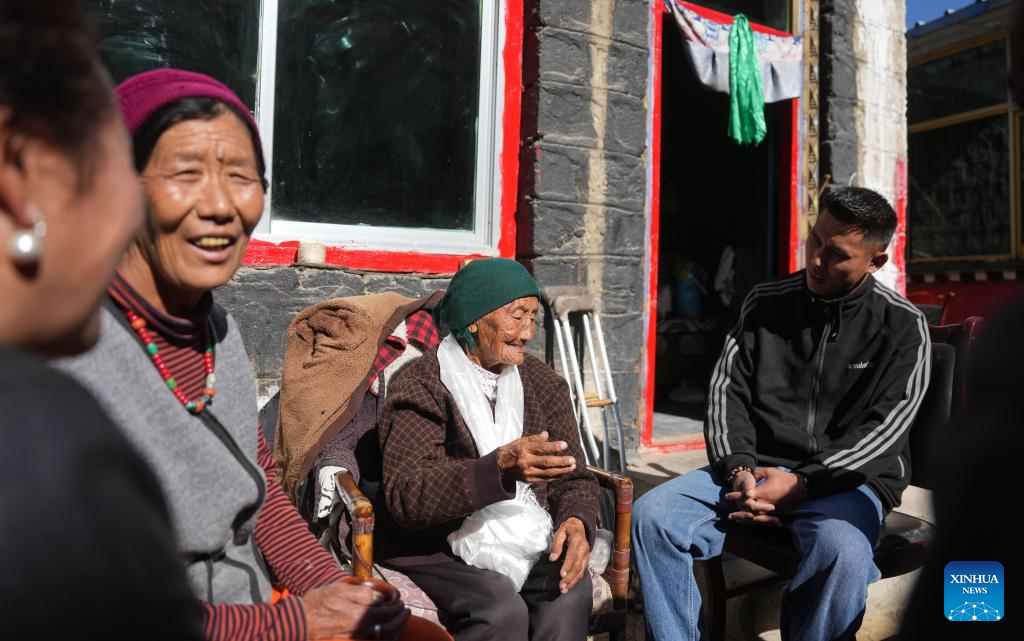
Monlam Sangmo (2nd R) talks with her daughter and neighbors in her yard at home in Doilungdeqen District of Lhasa, southwest China's Xizang Autonomous Region, March 20, 2025.
Ninety-one-year-old Monlam Sangmo lives in a village in Doilungdeqen District of Lhasa. She is a vibrant talker with a passion for singing and a beloved person in the village. Yet in old Xizang, her life was not happy because of the hardship.
Monlam Sangmo's father worked as a horse keeper for a local serf owner. If the horses would not eat the grass at night and the bells on the horses would not ring, the serf owner would accuse her father of neglecting to feed the horses and beat him brutally as punishment. Young Monlam Sangmo wept while trying to comfort her father, bewildered by why this was happening.
In resource-scarce old Xizang, the serf owners had priorities for irrigating their fields. "We could only water our fields at night, and this couldn't save our crops," Monlam Sangmo recalled. After harvests, serf owners bought grains at exploitative prices, leaving her family without enough food to survive, forcing them into deeper debt bondage.
In March 1959, people in Xizang launched the democratic reform that ended the region's feudal serfdom. Monlam Sangmo witnessed a tremendous change of her life. "In old Xizang, I never saw such abundance of food. I never tasted good tsampa (roasted barley flour)," she said, "In recent years, I have eaten things I had never seen before." (Xinhua/Jigme Dorje)
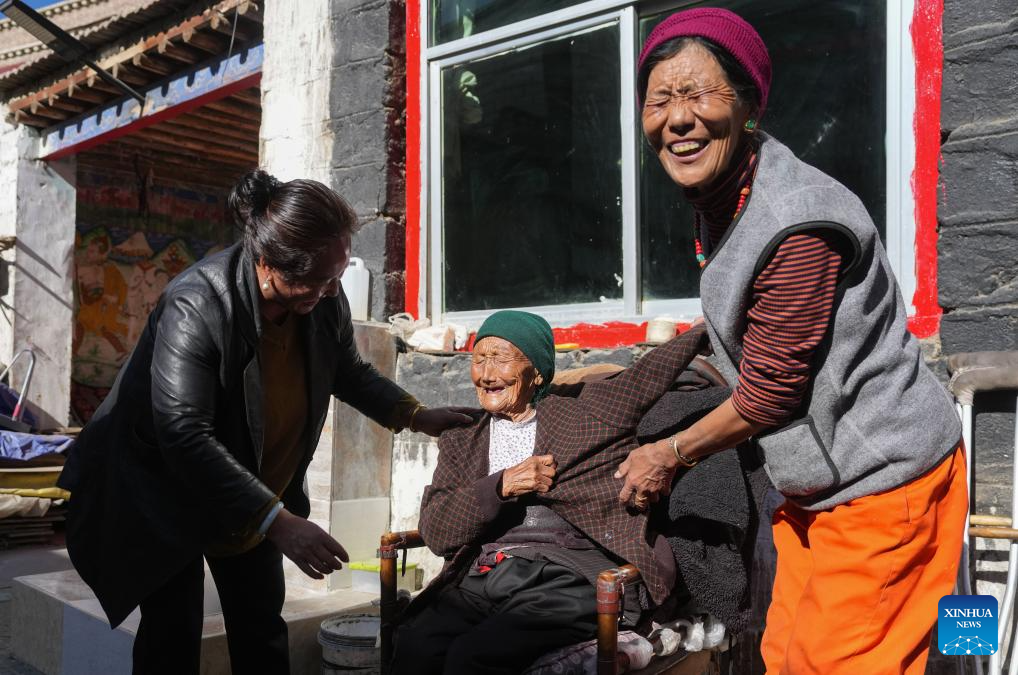
Monlam Sangmo (C) laughs with her daughter and neighbor in her yard at home in Doilungdeqen District of Lhasa, southwest China's Xizang Autonomous Region, March 20, 2025.
Ninety-one-year-old Monlam Sangmo lives in a village in Doilungdeqen District of Lhasa. She is a vibrant talker with a passion for singing and a beloved person in the village. Yet in old Xizang, her life was not happy because of the hardship.
Monlam Sangmo's father worked as a horse keeper for a local serf owner. If the horses would not eat the grass at night and the bells on the horses would not ring, the serf owner would accuse her father of neglecting to feed the horses and beat him brutally as punishment. Young Monlam Sangmo wept while trying to comfort her father, bewildered by why this was happening.
In resource-scarce old Xizang, the serf owners had priorities for irrigating their fields. "We could only water our fields at night, and this couldn't save our crops," Monlam Sangmo recalled. After harvests, serf owners bought grains at exploitative prices, leaving her family without enough food to survive, forcing them into deeper debt bondage.
In March 1959, people in Xizang launched the democratic reform that ended the region's feudal serfdom. Monlam Sangmo witnessed a tremendous change of her life. "In old Xizang, I never saw such abundance of food. I never tasted good tsampa (roasted barley flour)," she said, "In recent years, I have eaten things I had never seen before." (Xinhua/Jigme Dorje)
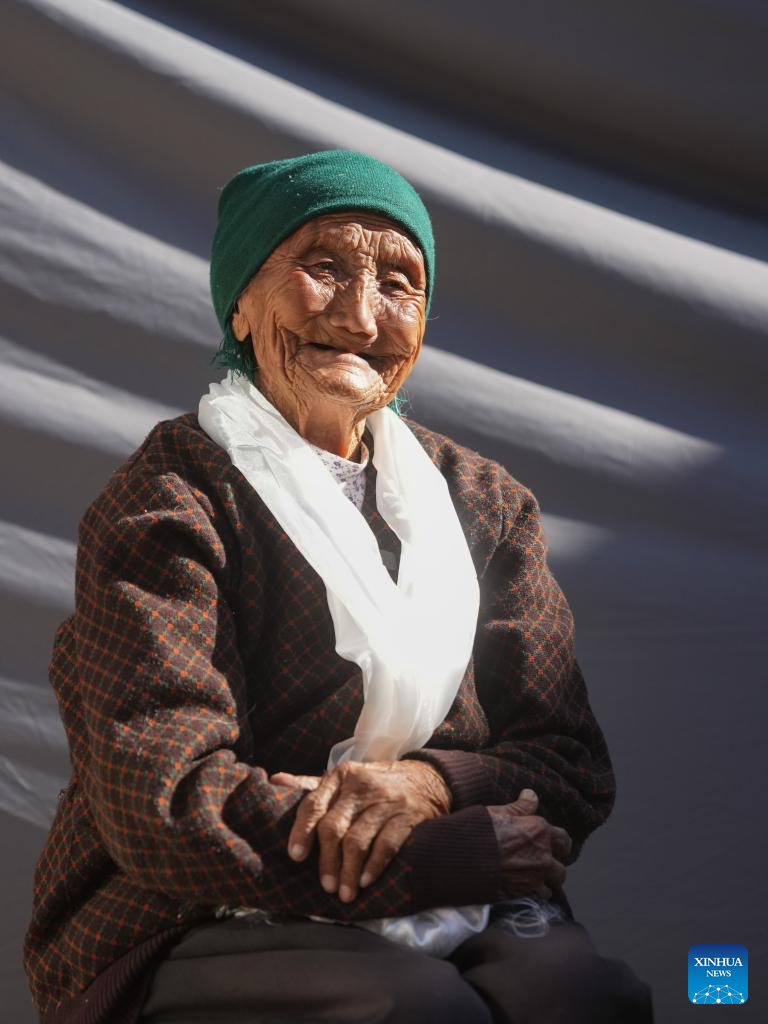
Monlam Sangmo is seen in Doilungdeqen District of Lhasa, southwest China's Xizang Autonomous Region, March 20, 2025.
Ninety-one-year-old Monlam Sangmo lives in a village in Doilungdeqen District of Lhasa. She is a vibrant talker with a passion for singing and a beloved person in the village. Yet in old Xizang, her life was not happy because of the hardship.
Monlam Sangmo's father worked as a horse keeper for a local serf owner. If the horses would not eat the grass at night and the bells on the horses would not ring, the serf owner would accuse her father of neglecting to feed the horses and beat him brutally as punishment. Young Monlam Sangmo wept while trying to comfort her father, bewildered by why this was happening.
In resource-scarce old Xizang, the serf owners had priorities for irrigating their fields. "We could only water our fields at night, and this couldn't save our crops," Monlam Sangmo recalled. After harvests, serf owners bought grains at exploitative prices, leaving her family without enough food to survive, forcing them into deeper debt bondage.
In March 1959, people in Xizang launched the democratic reform that ended the region's feudal serfdom. Monlam Sangmo witnessed a tremendous change of her life. "In old Xizang, I never saw such abundance of food. I never tasted good tsampa (roasted barley flour)," she said, "In recent years, I have eaten things I had never seen before." (Xinhua/Jigme Dorje)
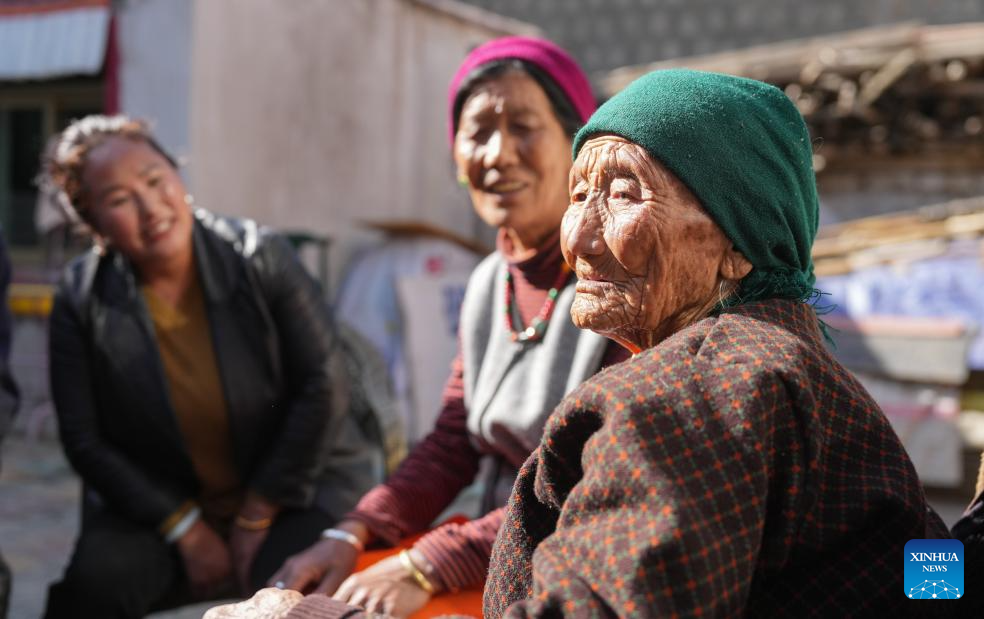
Monlam Sangmo (R) talks with her daughter and neighbor in her yard at home in Doilungdeqen District of Lhasa, southwest China's Xizang Autonomous Region, March 20, 2025.
Ninety-one-year-old Monlam Sangmo lives in a village in Doilungdeqen District of Lhasa. She is a vibrant talker with a passion for singing and a beloved person in the village. Yet in old Xizang, her life was not happy because of the hardship.
Monlam Sangmo's father worked as a horse keeper for a local serf owner. If the horses would not eat the grass at night and the bells on the horses would not ring, the serf owner would accuse her father of neglecting to feed the horses and beat him brutally as punishment. Young Monlam Sangmo wept while trying to comfort her father, bewildered by why this was happening.
In resource-scarce old Xizang, the serf owners had priorities for irrigating their fields. "We could only water our fields at night, and this couldn't save our crops," Monlam Sangmo recalled. After harvests, serf owners bought grains at exploitative prices, leaving her family without enough food to survive, forcing them into deeper debt bondage.
In March 1959, people in Xizang launched the democratic reform that ended the region's feudal serfdom. Monlam Sangmo witnessed a tremendous change of her life. "In old Xizang, I never saw such abundance of food. I never tasted good tsampa (roasted barley flour)," she said, "In recent years, I have eaten things I had never seen before." (Xinhua/Jigme Dorje)
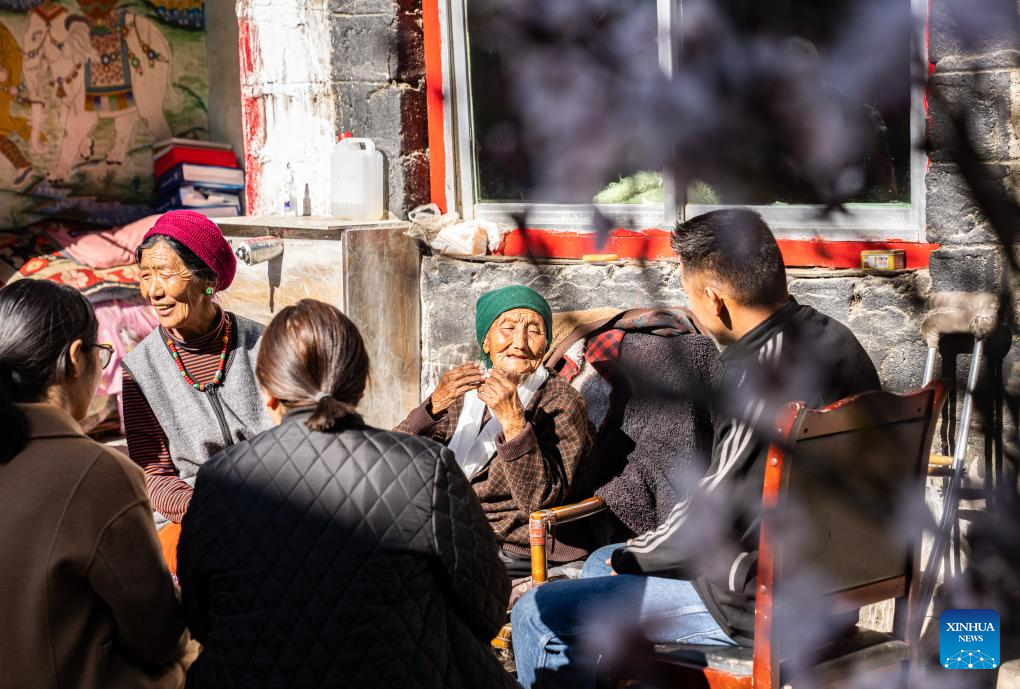
Monlam Sangmo (2nd R) talks with others in her yard at home in Doilungdeqen District of Lhasa, southwest China's Xizang Autonomous Region, March 20, 2025.
Ninety-one-year-old Monlam Sangmo lives in a village in Doilungdeqen District of Lhasa. She is a vibrant talker with a passion for singing and a beloved person in the village. Yet in old Xizang, her life was not happy because of the hardship.
Monlam Sangmo's father worked as a horse keeper for a local serf owner. If the horses would not eat the grass at night and the bells on the horses would not ring, the serf owner would accuse her father of neglecting to feed the horses and beat him brutally as punishment. Young Monlam Sangmo wept while trying to comfort her father, bewildered by why this was happening.
In resource-scarce old Xizang, the serf owners had priorities for irrigating their fields. "We could only water our fields at night, and this couldn't save our crops," Monlam Sangmo recalled. After harvests, serf owners bought grains at exploitative prices, leaving her family without enough food to survive, forcing them into deeper debt bondage.
In March 1959, people in Xizang launched the democratic reform that ended the region's feudal serfdom. Monlam Sangmo witnessed a tremendous change of her life. "In old Xizang, I never saw such abundance of food. I never tasted good tsampa (roasted barley flour)," she said, "In recent years, I have eaten things I had never seen before." (Xinhua/Tenzin Nyida)



